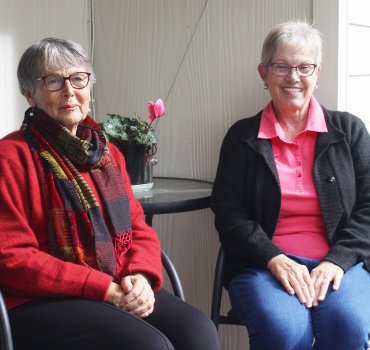

Cambridge residents Susan Mayes (left) and Marion Peterson hope to see more maintenance on their pensioner housing units after receiving the news that their rents will increase by $25 and $30 each week.
Pensioners facing rent rise in Waipā are at odds with the district council over the amount they must pay – and how well their units are maintained.
Weekly rent prices for the 129 pensioner housing units across Waipā are to rise between $5 and $30 a week from July 1.
The rents are assessed each year to compare them with market rents in Cambridge and Te Awamutu.
Marion Peterson, who lives at the council’s Vaile Court complex, believes the new rents will exceed a level which should be the ceiling for super annuitants. That level is 30 percent of their super.
She says she and her husband receive about $716 a week in superannuation and an accommodation supplement, and under the new fees will be paying $325 a week rent – more than the 30 percent limit.
Susan Mayes, a single pensioner living in Cambridge, said she accepted rents had to rise, but complained that “what annoys me is that nothing gets done”.
She had reported several issues with her unit and said she had received limited help from Council.
“My place is old, really old,” she said. “The floor is uneven; you can tell it’s sinking.
“I don’t have a bathroom vanity, it’s just a cracked sink with the pipes exposed. My bedroom is freezing. All five units in my complex have a big pane of glass fitted in a wooden frame in the bedrooms, south facing, and they’re just freezing. I can run my dehumidifier and I’ll fill it every day.
“I didn’t think I was going to be living in the lap of luxury, but I did think I was moving into a safe place. I thought Council could maintain the place and there would be a certain standard, but there is no standard.”
She said she had been told her handbasin issues were cosmetic.
Marion Peterson said one of the reasons she wanted to talk out about these issues was most of the pensioners would not speak up for themselves.
Waipā mayor Jim Mylchreest disputed suggestions the new rate exceeded the 30 percent level.
“I can absolutely assure people that no tenant receiving only superannuation will pay more than 30 per cent of their gross amount of superannuation or market rent – whichever is less. That’s what our policy guarantees,” he said.
“If any tenant is not getting the maximum accommodation supplement, there must be a reason for that. Either they have another income stream or money or assets which means they are not entitled to the maximum available. Either way, that is an issue between the tenant and the government. Council has no say over what benefits tenants get; we’re not even privy to that information. We’ve simply capped rents to help those who are most vulnerable.”
The Mayor said the Council-owned pensioner housing units were probably the most affordable rentals in the district, “and that’s why we have a waiting list of 32 people hoping for a unit to come up.”
He was disappointed to hear that some tenants felt Council wasn’t responding quickly enough.
“We are genuinely trying to make sure people have an affordable, warm place to live. But we also have to prioritise work as it comes up and do the most important things as quickly as possible. If anybody has an issue, they should ring Council’s tenancy officer directly and raise it.”
The council will roll out a double-glazing programme for all its pensioner housing units, beginning at Wallace Court in Cambridge next month.
The mayor said in the last three years, the Council has been upgrading pensioner housing units, funded by rents. Some units were re-insulated and all 129 were fitted with heat pumps and extractor fans.
Security screens were installed on front and back doors, and the exteriors of some units were painted. Locks were upgraded to a master key system in case of emergencies.
He was aware of concerns around the extractor fans and would resolve it.
Meanwhile, social media debate on the issue has focussed on who should provide the service.
Some Cambridge residents discussing the pensioner rent increase have argued housing services should be provided by central government, not local government. Several councils in New Zealand have taken that route.
The Mayor was aware of that view but said Waipā District Council plans to do more to serve pensioners and will build more units over the next three years. Land has been purchased in Te Awamutu for that purpose.
“Some people do not believe that providing pensioner housing is appropriate for a Council, however that is not the view of Waipā’s elected members who have made an absolute commitment to pensioner housing.”








